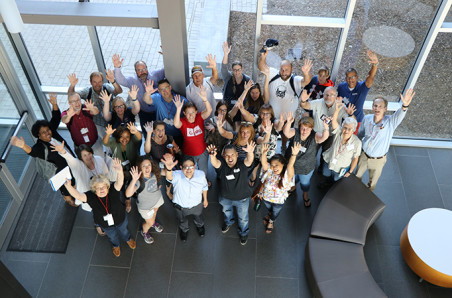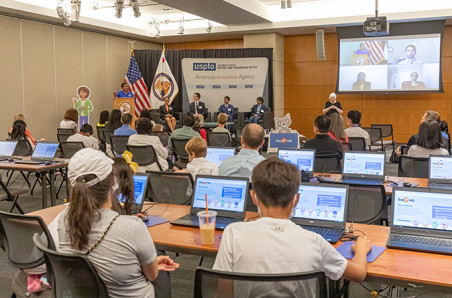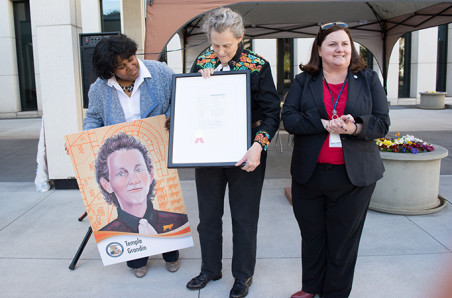
Educators Patty Lipka of the Cade Museum and the USPTO's Reggie Duncan make Oobleck out of corn starch. (Screenshot by USPTO)
Giving thanks to our inventors
If you’ve ever helped cook a delicious Thanksgiving feast, you know just how much effort goes into the meal. From peeling spuds for a classic side dish, to getting the perfect roast on your chosen bird, to the dreaded clean-up duty after everyone has had their fill of pie, this celebration is made possible by hard work – and generations of inventors. The USPTO and Cade Museum have teamed up to explore Thanksgiving through innovation education.
Creative minds throughout American history have designed some of the basic kitchen products we use every day that make cooking so much easier. From the pop-up timer that measures the temperatures of our turkeys to the ovens we cook them in, we give thanks to these inventors. That's why, in these new, do-it-yourself videos with our friends at the Cade Museum for Creativity and Invention in Gainesville, Florida, we're inviting you to learn about intellectual property (IP) in the kitchen.
Inventors make life easier in ways big and small, and mealtime is no exception. In food production, preservation, and safe cooking practices, Americans use patented technology in the kitchen every day. The potato peeler, vegetable shortening, and storage containers used for leftovers are just a few examples of commonly used innovations with technology protected by patents. Patents provide protection throughout the food chain by giving the inventors of unique products the exclusive rights over their inventions for a period of time so they can potentially license its use in the market, where it’s purchased by consumers (and aspiring cooks) like you.
The USPTO is teaming up with the Cade Museum on invention education activities participants can enjoy from their kitchens. This series of videos – starting with one on November 6 and with the newest video debuting today – show with hands-on lessons how major technological advances of past innovators are still used today.
In four videos, participants will get a tour of making a Thanksgiving meal through the lens of science and IP. Families will learn about some historic examples of mealtime innovation while inspiring the next generation of innovators to think creatively, solve problems, and make something new out of common household items.
Using cooking and kitchen implements as examples, these videos demonstrate that some of the more unexpected things in our lives all have patents and protected IP behind them. That’s where the USPTO comes in, helping inventors safeguard their valuable ideas through patents and trademarks, incentivizing future innovation.
“The kitchen is the perfect place to practice Inventivity®,” says Patty Lipka, director of experiential education at the Cade Museum, and a co-star of this series. “We hope that this series inspires families across the country to get curious about the inventions around them and recognize that creativity and inventiveness live inside us all.”
Videos will be released on Wednesdays throughout the month of November, so families can purchase supplies before the weekend. Learners of all ages are encouraged to get their hands dirty and explore scientific concepts like melting points and non-Newtonian fluids. Young innovators will learn about viscosity while making Oobleck, a sticky substance whose primary ingredient is cornstarch. Educators will unlock the science behind a pop-up turkey timer and help young musicians make a kazoo out of wax paper. Families will explore the concept of hydrophobic substances while making play clay out of a favorite dessert ingredient: cocoa.
“Science, invention, and IP are all around us every day, and anyone can be an inventor,” says Reggie Duncan, a USPTO education program specialist and past recipient of the Presidential Award for Excellence in Mathematics and Science Teaching. “I love how these videos can unlock the wonderful world of invention for kids of all ages with materials from around the home, a sprinkle of curiosity, and a dash or two of fun!”
This culinary campaign also pays homage to some of the inventors who made our modern Thanksgiving meals possible.

From left to right: Patent drawing of Martha Jones' corn husker, photo of Josephine Cochrane, and patent drawing of Alfred Cralle's ice cream scoop. (USPTO photo-illustration)
In 1868, Martha Jones of Amelia County, Virginia, received a patent for a corn husker that was capable of “husking, shelling, cutting up the basics, and separating them from the grain in one operation.” One of the first known African American women to receive a U.S. patent, her machine made preparing one of the most commonly used vegetables more convenient.
Three decades later, Alfred Cralle invented the one-handed ice cream scoop while working as a porter in a Pittsburgh hotel. Cralle noticed that servers had difficulty scooping ice cream; it required two hands and at least two serving utensils. Cralle’s solution, a mechanical scoop with a built-in scraper, made it possible to do the job one-handed. If you like your pie a la mode, thank Alfred Cralle!
Inventors even made meal clean-up and storage easier. In 1886, Josephine Cochrane received a patent for the first commercially viable dishwashing machine. After growing frustrated with her fancy dinnerware getting chipped during hand-washing, she determined, “If nobody else is going to invent a dishwashing machine, I'll do it myself.”
Whether you’re making a quick lunch or an elaborate holiday spread, Jones, Cralle, Cochrane, and thousands of other inventors have improved our experiences in the kitchen. We hope that introducing invention education to kids early on will spark the next great culinary discovery.
These free educational videos, including a list of ingredients and instructions, will be posted on the USPTO’s YouTube channel every Wednesday throughout November. Check out the playlist and subscribe.
Thank you to all of our inventors, past, present, and future. We wish you a very happy Thanksgiving.

Patty Lipka of the Cade Museum and the USPTO's Reggie Duncan tape a video in August 2024 in the museum's kitchen in Gainesville, Florida. (Photo by Michael Connor/USPTO)
Engage with the Director and join the conversation on our social media channels.




